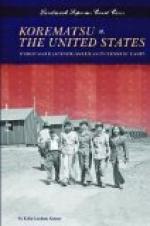|
This section contains 924 words (approx. 4 pages at 300 words per page) |

|
Koremastu versus the United States
Summary: Discusses the Supreme Court Case Koremastu versus the United States. Explains the issues of the case. Describes how the constitutionality of internment camps.
Japanese-American Internment Camps was a very important Supreme Court case because it challenged the 5th and 14th amendments during a national emergency. During World War II, after the Japanese bombed Pearl Harbor, all persons of Japanese heritage were forced into Internment Camps. Fred Korematsu was a Japanese-American who did not have many Japanese ties; he could barely speak the language. When police confronted him, he refused to leave his home. A court case was opened that eventually became a Supreme Court case to attempt to deem this action unconstitutional.
On December 7, 1941, Japan bombed Pearl Harbor in Hawaii and pulled the United States into World War II. With a feared invasion of the west coast by the Japanese and the possibility that Japanese-Americans would sabotage defenses, President Roosevelt issued executive order #9066, which was passed by Congress in March of 1941. This order declared: "the successful prosecution of the war requires...
|
This section contains 924 words (approx. 4 pages at 300 words per page) |

|


